Health Benefits Of Almond Milk You Should Know About
From youthful skin to blood pressure regulation - almond milk has more benefits than expected.
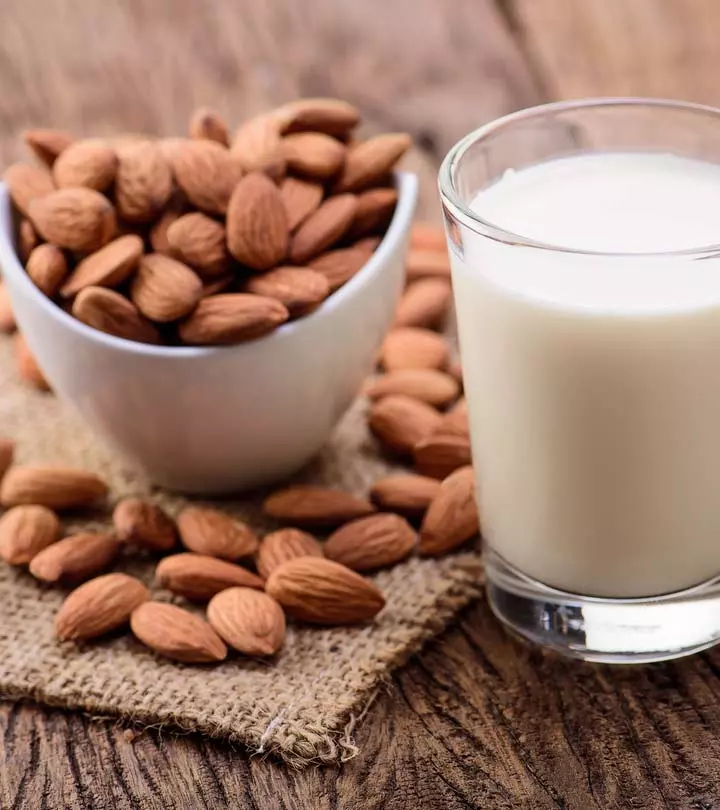
Image: Shutterstock
Almond milk benefits are not limited to its rich taste. It is an extremely nutritious plant-based milk and a popular choice amongst consumers. It is a dairy alternative for people who are lactose intolerant and vegans and a low-fat option for people who follow a strict diet. Read on to learn more about its health benefits, nutritional content, potential side effects, and how to use almond milk in your diet.
In This Article
What Is Almond Milk? Is It Good For You?
As the name suggests, almond milk is made from almonds. It is especially known for its creamy texture and nutty flavor. It is a popular substitute for cow milk. Compared to other plant-based milk, almond milk is more easily available and rich in many nutrients that are believed to offer an array of health benefits.
Almond milk is considered a beneficial source of nutrients as almonds are loaded with many health-promoting vitamins and minerals. Many people use it in regular cooking and for consumption like regular milk.
In a survey of 8,288 U.S. adults, participants were asked about their milk preferences. The responses indicate that 28% prefer whole milk, 9% favor skim milk, 5% of respondents prefer lactose-free milk, and 12% opt for dairy-free alternatives such as soy milk or almond milk.
Unsweetened almond milk is a nutritious drink. However, most of the commercially available almond milk varieties are laden with artificial sweeteners.
Keep reading to learn about the health benefits associated with the consumption of almond milk.
Key Takeaways
- Almond milk has a creamy, nutty texture and is often used as an alternative to dairy by vegans and people with lactose intolerance.
- Almond milk contains fewer calories and lesser fat than whole milk, and unsweetened almond milk is good for people with heart problems because it is cholesterol-free.
- This milk is believed to reduce blood sugar levels, regulate weight, and strengthen the bones.
6 Health Benefits Of Almond Milk
1. Good For Managing Diabetes
Almonds are added to many diets for the benefits they offer. It has been proven that almonds have a significant impact on diabetic levels. They are known to improve glycemic control (1). It was also found that fermented almond milk tea can act as a potential anti-diabetic drink by decreasing plasma glucose and increasing serum insulin (2). Hence, including it in your regular diet may help in managing your diabetic levels.
2. May Have Anti-Aging Effects
Almonds serve as a decent source of vitamin E, which plays a major role in combating liver disease and atherosclerosis (3).
The use of almonds for promoting skin health has also been popular since ancient times. Almonds are used in many skin care creams and face packs. It has been proven that regular almond consumption effectively reduces wrinkle formation and exhibits anti-aging effects (4).
3. May Improve Bone Health
Almond milk is a good source of calcium (5). Sufficient calcium intake is directly related to promoting bone health. Additionally, it is also associated with many health benefits like lowering blood pressure, prevention of osteoporosis, lowering cholesterol values, and reduction of hypertensive disorders during pregnancy (6). Hence, including almond milk in your diet may help you in many ways, along with promoting bone health.
4. May Reduce The Risk Of Cardiovascular Disease
It is a known fact that the risk of cardiovascular disease is increasing day by day due to a rise in sedentary lifestyle and bad food habits. Nut consumption is believed to reduce the risk of many health conditions, including cardiovascular disease. Research also says that almond consumption can significantly manage dyslipidemia, which is one of the major risk factors of cardiovascular disease (7). It has also been found that regular consumption of almonds decreases LDL cholesterol levels (8), (9).
5. May Reduce Blood Pressure
One of the lesser-known benefits of almonds is their ability to reduce blood pressure. Regular consumption of almonds can significantly reduce diastolic blood pressure (10). Hence, consuming almond milk may help in managing blood pressure levels. However, consult a doctor before you switch to almond milk if you have blood pressure issues.
6. May Help Boost Antioxidant Levels
Almonds are a potent source of antioxidants, including vitamin E and polyphenols. They not only enhance antioxidant levels but also provide essential nutrients like magnesium, fiber, and healthy fats. Vitamin E in almonds protects cell membranes from oxidation, while polyphenols contribute to additional antioxidant benefits like supporting heart health and reducing inflammation. So regular consumption of almonds can support overall health by enhancing the body’s defense against oxidative damage (11). Incorporating almonds into a balanced diet as a snack, in salads, or as almond butter offers a natural and delicious way to increase antioxidant intake and promote well-being.
Now that you know all the health benefits almond milk offers, let’s check out its nutritional profile.
Almond Milk Nutrition Facts
According to the US Department of Agriculture, 100 ml of almond milk contains the following nutrients (12):
- Energy: 17 kcal
- Protein: 0.42 g
- Total lipid (fat): 1.25 g
- Carbohydrate: 0.83 g
- Fiber: 0.4 g
- Sugar: 0.42 g
- Calcium: 42 mg
- Iron: 0.15 mg
- Potassium: 79 mg
- Sodium: 75 mg
- Vitamin A: 208 IU
- Vitamin E: 4 mg
- Vitamin D (D2 + D3): 42 IU
- Fatty Acids: 0 g
- Cholesterol: 0 g
As you can see, almond milk is filled with many great nutrients. Still wondering why you should pick almond milk over cow milk? Find out in the next section.
Almond Milk Vs. Whole Milk
First, let’s compare the nutritional profiles of whole milk and almond milk (12), (13):
| Nutrients | Whole Milk (100 ml) | Almond Milk (100 ml) |
| Energy | 60 kcal | 17 kcal |
| Protein | 3.28 g | 0.42 g |
| Total Lipid (Fat) | 3.2 g | 1.25 g |
| Carbohydrate | 4.67 g | 0.83 g |
| Fiber | 0 g | 0.4 g |
| Sugars | 4.81 g | 0.42 g |
| Calcium | 123 mg | 42 mg |
| Iron | 0 mg | 0.15 mg |
| Potassium | 150 mg | 79 mg |
| Sodium | 38 mg | 75 mg |
| Vitamin A | 32 µg | 208 IU |
| Vitamin E | 0 mg | 4 mg |
| Vitamin D (D2 + D3) | 1.1 µg | 42 IU |
| Fatty Acids | 1.86 g | 0 g |
| Cholesterol | 12 mg | 0 g |
There are many key differences between whole milk and almond milk:
- As you can see, whole milk is high in fat, calories, and protein. Unsweetened almond milk contains comparatively lesser fat and calories, making it a healthier alternative.
- Whole milk is a better source of calcium than almond milk, making it a better choice for people with bone-related health issues.
- Unsweetened almond milk is better for people with heart problems as it is completely free of cholesterol.
- People who are lactose intolerant should opt for almond milk over whole milk as it is lactose-free.
Whole milk and almond milk are good in their own ways for different groups of people. If you would like to add almond milk to your diet, scroll down to the next section.
How To Add Almond Milk To Your Diet
Incorporating almond milk into your daily routine is a tasty and healthy choice. You can easily enjoy its benefits by adding it to various meals and snacks. From smoothies to baking, there are many creative ways to include almond milk in your diet. Almond milk has a creamy texture and rich flavor, which makes it a delicious addition to your diet. You can include it in your diet in many ways:
- It can be added to tea or coffee, just like regular milk. However, do not boil it to retain its creamy texture.
- You can add almond milk to your cereal.
- It can be a tasty addition to oatmeal or overnight oats.
- You can try adding almond milk to all the regular dishes that use milk, like cakes and muffins.
- Smoothies and hot chocolate can be made using almond milk.
 Pro Tip
Pro Tip- You can also use it to make ice cream.
- It can also be consumed directly as a substitute for regular milk.
- Almond yogurt can be prepared using almond milk.
Wondering how to choose the best almond milk for your needs? Find out below!
How To Choose The Best Almond Milk
Many almond milk varieties are available commercially. You can get them in different flavors. However, most of the varieties are sweetened with artificial sweeteners.
It is always best to choose unsweetened almond milk. Check the ingredient list on the label for any added artificial ingredients, and always try to avoid such varieties. Ideally, almond milk should just contain almonds, water, and sea salt.
 Trivia
TriviaIt is always good to make your own almond milk. The process of making it is simple and quick. The next section lists the recipe for homemade almond milk. Check it out!
How To Make Your Own Almond Milk
Always use good-quality almonds while making almond milk at home to get a creamy texture and nutty flavor.
What You Need
- 300 grams almonds
- 4 cups water
- ¼ tablespoon sea salt
- 5 tablespoons honey (optional)
Method
- Soak the almonds overnight in water.
- Remove them from water and peel off the skin.
- In a blender jar, add the almonds and 2 cups of water. Blend to a fine paste.
- Add the remaining water and blend until smooth.
- Filter the liquid using a muslin cloth.
- Mix in the sea salt.
- You can also add honey for sweet almond milk.
You can store this milk for a week in the refrigerator. Do not freeze it.
While almond milk is healthy and delicious, there are some side effects of almond milk as well that you should know about before including it in your diet routine. Find out more below.
Potential Side Effects Of Drinking Almond Milk
Almond milk is generally safe when consumed. However, anecdotal evidence suggests that consuming it in excess may cause some undesirable effects.
- May Cause An Allergic Reaction
If you observe any rashes or itchy patches on your skin or tongue after drinking almond milk, stop consuming it immediately and consult a doctor without further delay. Anecdotal evidence suggests there is a high chance that almond milk may also aggravate any existing nut allergies.
- May Cause Harmful Gastrointestinal Issues
Homemade almond milk is considered safe unless it is stored beyond its shelf life. But, store-bought almond milk may trigger harmful gastrointestinal issues. These are not directly caused by almond milk but due to a compound known as carrageenan, which is used as a food additive. It has exhibits negative effects, like colonic ulcerations and gastrointestinal neoplasm (14).
Note: It can also cause nutritional deficiencies. As it is plant-based milk, almond milk lacks protein. If you are trying to replace regular milk with it, try including other protein-rich foods (such as lentils, tofu, green peas, and chickpeas) in your diet regularly to fill in the protein gap. It is proven that protein is required for maintaining muscle mass and promoting bone health (15). Hence, consuming the required amount of protein is beneficial for your overall health.
In A Nutshell
Almond milk is a great vegan, lactose-free, and nutritious alternative to whole cow milk. It is replete with many vitamins, minerals, and beneficial compounds. Almond milk benefits include stronger bones and better heart health. In addition, it is a good source of vitamin E that helps delay the early signs of aging and rejuvenate your skin. To reap these benefits, you can substitute regular cow milk with almond milk in your smoothies, breakfast cereals, or coffee. However, do not consume almond milk in excess, as it may otherwise trigger allergic reactions or cause gastrointestinal issues. Consult your doctor if you experience any adverse effects.
Frequently Asked Questions
Is it okay to drink almond milk every day?
Yes, you can drink almond milk daily if you have no nut allergies.
Does almond milk make you poop?
Almond milk is rich in fiber which helps reduce constipation and keep your digestive system healthy (16).
Is almond milk good for losing belly fat?
Almond milk has no cholesterol and is rich in essential vitamins and minerals. As a result, it can make for a healthy addition to your weight loss diet.
Does almond milk make you sleepy?
Yes, almonds are a good source of sleep-inducing melatonin, making almond milk a good option to help you sleep (17).
Is almond milk good for eyesight?
Yes, almonds are good sources of vitamins A, E, and zinc which play a significant role in good eye health and preventing degeneration (18).
Does almond milk mess with hormones?
No, almonds don’t affect your hormones in the way hormone-fortified cow milk could do. Though almonds contain phytoestrogen, there is no scientific evidence that it can mess with your hormonal balance.
How does almond milk compare nutritionally with soy milk and oat milk?
Almond milk is lower in protein compared to soy milk, making it less ideal for those seeking a high-protein plant-based drink. However, it is lower in calories and sugar, making it a good option for those seeking to reduce their calorie intake. Oat milk is similar in calories to almond milk but contains more carbohydrates and fiber, making it a good choice for those who want to boost their fiber intake (12),(19),(20).
Almond milk makes a popular lactose-free alternative, which is versatile and can be enjoyed in various ways. Uncover whether this milk is for you or not from the video below. Check it out!
References
Articles on StyleCraze are backed by verified information from peer-reviewed and academic research papers, reputed organizations, research institutions, and medical associations to ensure accuracy and relevance. Read our editorial policy to learn more.
- Almond consumption improved glycemic control and lipid profiles in patients with type 2 diabetes mellitus
https://pubmed.ncbi.nlm.nih.gov/20580779/ - Development of Novel Fermented Almond Milk Tea and It’s Evaluation as Antidiabetic Drink
https://www.researchgate.net/publication/349454581_Development_of_Novel_Fermented_Almond_Milk_Tea_and_It’s_Evaluation_as_Antidiabetic_Drink - Evidence for beneficial effects of vitamin E
https://www.ncbi.nlm.nih.gov/labs/pmc/articles/PMC4578028/ - Prospective randomized controlled pilot study on the effects of almond consumption on skin lipids and wrinkles
https://www.ncbi.nlm.nih.gov/labs/pmc/articles/PMC6916293/ - Plant-based milk alternatives an emerging segment of functional beverages: a review
https://www.ncbi.nlm.nih.gov/pmc/articles/PMC5069255/ - Calcium Intake and Health
https://www.ncbi.nlm.nih.gov/labs/pmc/articles/PMC6683260/ - Almonds and Cardiovascular Health: A Review
https://www.ncbi.nlm.nih.gov/labs/pmc/articles/PMC5946253/ - Serum lipid response to the graduated enrichment of a Step I diet with almonds: a randomized feeding trial
https://pubmed.ncbi.nlm.nih.gov/12791613/ - Effects of almond consumption on the reduction of LDL-cholesterol: a discussion of potential mechanisms and future research directions
https://pubmed.ncbi.nlm.nih.gov/21457263/#:~:text=Almonds%20have%20been%20found%20to - The effect of almond intake on blood pressure: A systematic review and meta-analysis of randomized controlled trials
https://pubmed.ncbi.nlm.nih.gov/32444059/#:~:text=Pooled%20analysis%20suggested%20that%20almond - Antioxidant Effects from Eating Almonds
https://www.ars.usda.gov/news-events/news/research-news/2008/antioxidant-effects-from-eating-almonds/ - [Historical Record]: Almond Milk
https://fdc.nal.usda.gov/fdc-app.html#/food-details/476436/nutrients - Milk whole
https://fdc.nal.usda.gov/fdc-app.html#/food-details/1097512/nutrients - Review of harmful gastrointestinal effects of carrageenan in animal experiments.
https://www.ncbi.nlm.nih.gov/labs/pmc/articles/PMC1242073/ - Health effects of protein intake in healthy elderly populations: a systematic literature review
https://www.ncbi.nlm.nih.gov/labs/pmc/articles/PMC3926464/ - Dietary fibre in foods: a review – PMC
https://www.ncbi.nlm.nih.gov/pmc/articles/PMC3614039/ - Dietary Sources and Bioactivities of Melatonin – PMC
https://www.ncbi.nlm.nih.gov/pmc/articles/PMC5409706/ - Nutrients for the aging eye – PMC
https://www.ncbi.nlm.nih.gov/pmc/articles/PMC3693724/ - Soy milk, unsweetened, plain, shelf stable
https://fdc.nal.usda.gov/food-details/1999630/nutrients - Oat milk, unsweetened, plain, refrigerated
https://fdc.nal.usda.gov/food-details/2257046/nutrients
Read full bio of Reda Elmardi
Read full bio of Aparna Mallampalli
Read full bio of Arshiya Syeda
Read full bio of Sindhu Koganti






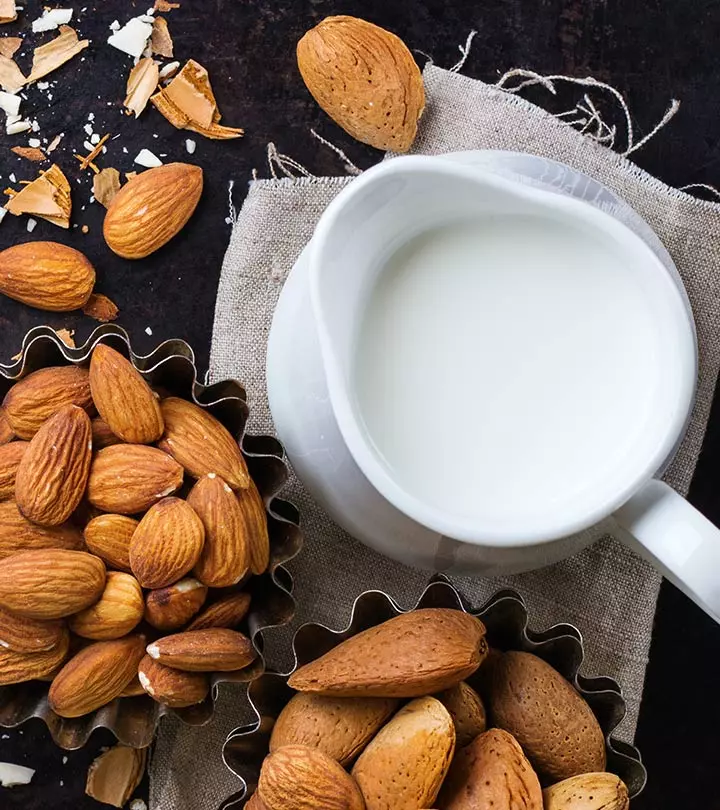




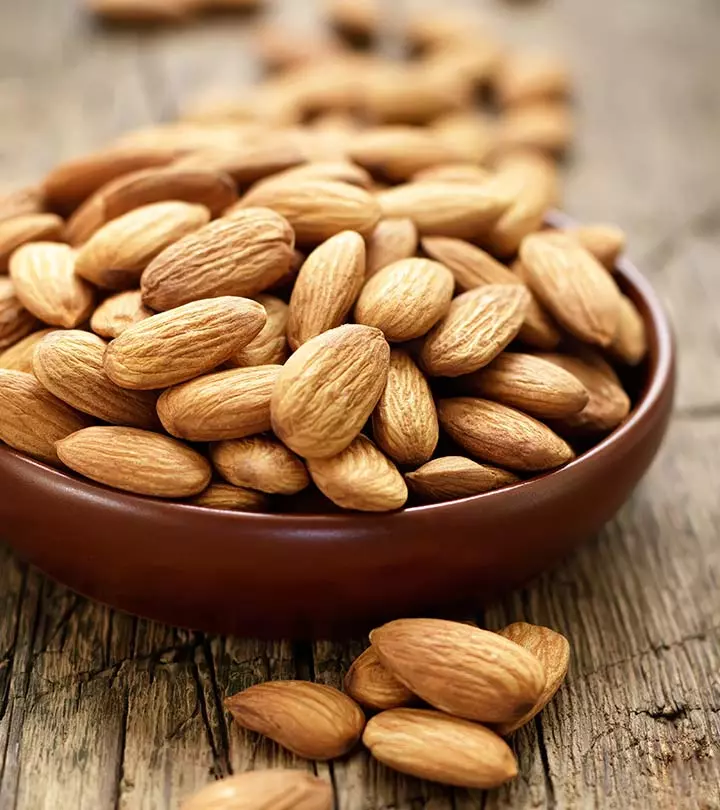

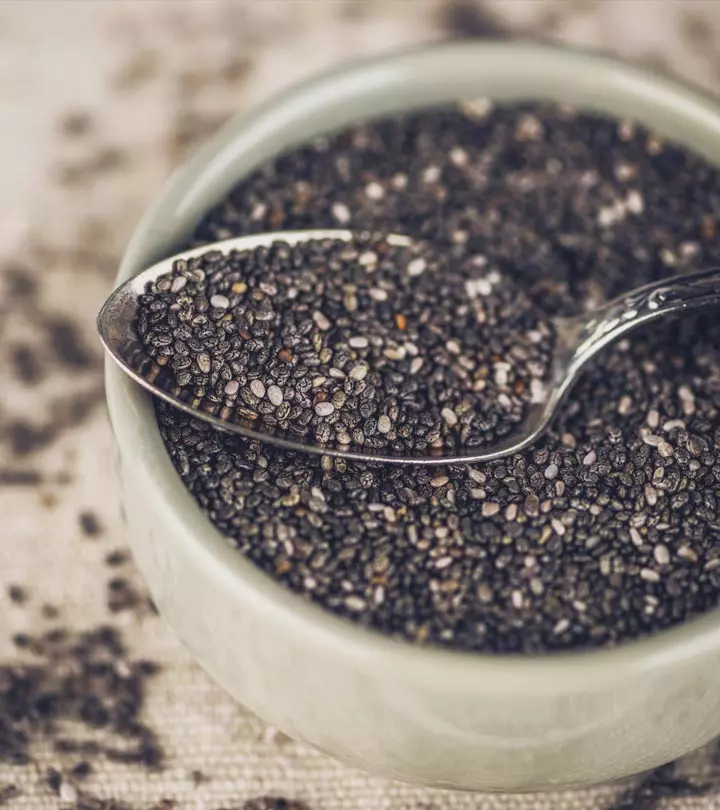
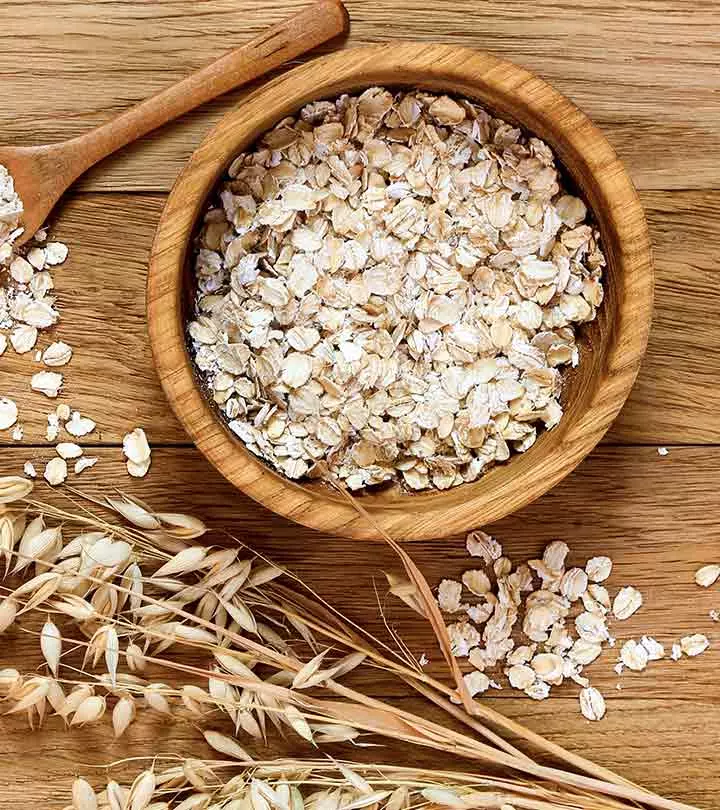












Community Experiences
Join the conversation and become a part of our empowering community! Share your stories, experiences, and insights to connect with other beauty, lifestyle, and health enthusiasts.